新牛津译林版八年级上8A-Unit1-8语法总结
新牛津译林版八年级上8A Unit1-8语法总结

新牛津译林版八年级上8A Unit1-8语法总结形容词和副词都有三个等级,即原级、比较级和最高级。
比较级用于两者之间的比较,表示“更……”,而最高级用于三者或三者以上之间的比较,表示“最……”。
比较级前面通常会加much、even或a little修饰,其中even和much只能修饰比较级。
常见的修饰语包括still、even、any、quite(a bit)、almost、nearly、just、rather、a little、a bit、much、a lot、far、many、twice、ten times、one fourth、two pounds和three years。
形容词的比较级和最高级的构成有规则变化和不规则变化。
规则变化包括直接加、去e加、双写加、变y加以及more/most。
不规则变化则是指一些常见的形容词,如good/well、bad/ill、many/much、little、far、old以及XXX等。
形容词的比较等级还有一些常见的句型,如“A=BA+ V + as + adj./adv。
+ as + B”(与……一样)、“A≠ BA + V + not +as/so + adj./adv。
+ as + B”(与……不一样)以及“A。
B或A <B,A + V +比较级+ than + B”(比……更……)。
这些句型可以帮助我们更好地理解和运用形容词的比较等级。
XXX.XXX。
we can use the structure A + V + twice/four times/。
+ as + adj./adv。
+ as + B。
For example。
"This room is twice as large as that one" means that the entire room is twice the size of the other room。
牛津译林版八年级上册8A英语期末复习各单元语法知识点提纲
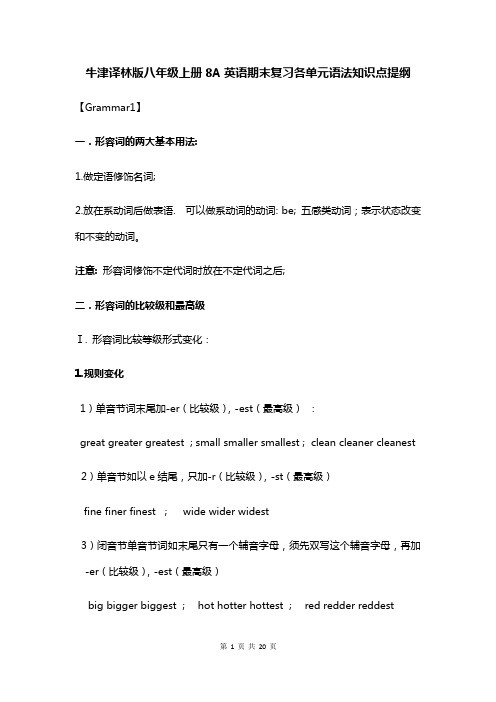
牛津译林版八年级上册8A英语期末复习各单元语法知识点提纲【Grammar1】一.形容词的两大基本用法:1.做定语修饰名词;2.放在系动词后做表语. 可以做系动词的动词: be; 五感类动词;表示状态改变和不变的动词。
注意:形容词修饰不定代词时放在不定代词之后;二.形容词的比较级和最高级Ⅰ. 形容词比较等级形式变化:1.规则变化1)单音节词末尾加-er(比较级),-est(最高级) :great greater greatest ; small smaller smallest ; clean cleaner cleanest 2)单音节如以e结尾,只加-r(比较级),-st(最高级)fine finer finest ; wide wider widest3)闭音节单音节词如末尾只有一个辅音字母,须先双写这个辅音字母,再加-er(比较级),-est(最高级)big bigger biggest ; hot hotter hottest ; red redder reddest4)以辅音字母+y结尾的词,则变y为-i,再加-er和-est。
easy easier easiest ; busy busier busiest5)部分双音节和多音节词在前面加单词more和most。
Careful more careful most carefulDifficult more difficult most difficult2.不规则变化good/well better best bad/ill worse worstmany/much more most little less leastfar farther/further farthest/furthest注:有些形容词一般没有比较等级。
如: right, wrong等。
三. 形容词比较级的用法:表示两者(人或物)的比较。
⒈表达“A大于B”用 A …比较级+than B①. Tom比我胖。
译林版八年级上册英语8A Unit 1-Unit 8词组句型汇总
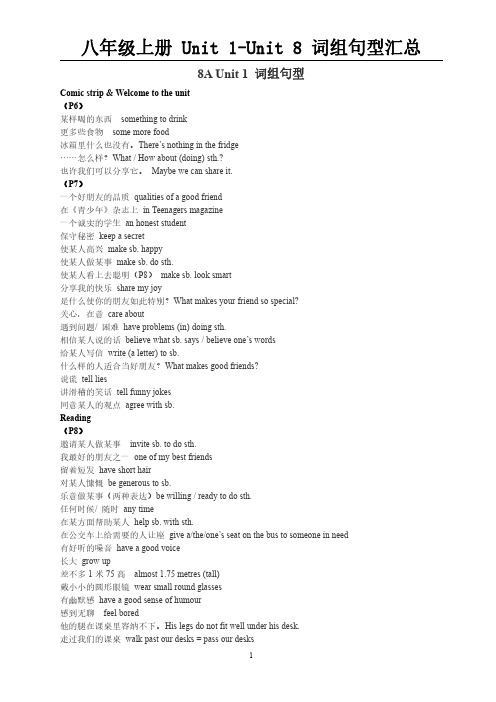
8A Unit1词组句型Comic strip&Welcome to the unit(P6)某样喝的东西something to drink更多些食物some more food冰箱里什么也没有。
There’s nothing in the fridge……怎么样?What/How about(doing)sth.?也许我们可以分享它。
Maybe we can share it.(P7)一个好朋友的品质qualities of a good friend在《青少年》杂志上in Teenagers magazine一个诚实的学生an honest student保守秘密keep a secret使某人高兴make sb.happy使某人做某事make sb.do sth.使某人看上去聪明(P8)make sb.look smart分享我的快乐share my joy是什么使你的朋友如此特别?What makes your friend so special?关心,在意care about遇到问题/困难have problems(in)doing sth.相信某人说的话believe what sb.says/believe one’s words给某人写信write(a letter)to sb.什么样的人适合当好朋友?What makes good friends?说谎tell lies讲滑稽的笑话tell funny jokes同意某人的观点agree with sb.Reading(P8)邀请某人做某事invite sb.to do sth.我最好的朋友之一one of my best friends留着短发have short hair对某人慷慨be generous to sb.乐意做某事(两种表达)be willing/ready to do sth.任何时候/随时any time在某方面帮助某人help sb.with sth.在公交车上给需要的人让座give a/the/one’s seat on the bus to someone in need 有好听的嗓音have a good voice长大grow up差不多1米75高almost1.75metres(tall)戴小小的圆形眼镜wear small round glasses有幽默感have a good sense of humour感到无聊feel bored他的腿在课桌里容纳不下。
译林版英语八上全册语法复习
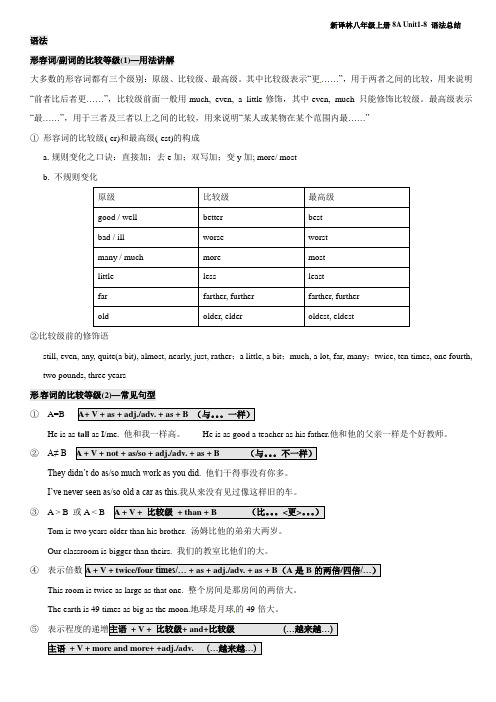
语法形容词/副词的比较等级(1)—用法讲解大多数的形容词都有三个级别:原级、比较级、最高级。
其中比较级表示“更……”,用于两者之间的比较,用来说明“前者比后者更……”,比较级前面一般用much, even, a little修饰,其中even, much 只能修饰比较级。
最高级表示“最……”,用于三者及三者以上之间的比较,用来说明“某人或某物在某个范围内最……”①形容词的比较级(-er)和最高级(-est)的构成a.规则变化之口诀:直接加;去e加;双写加;变y加; more/ mostb. 不规则变化原级比较级最高级good / well better bestbad / ill worse worstmany / much more mostlittle less leastfar farther, further farther, furtherold older, elder oldest, eldest②比较级前的修饰语still, even, any, quite(a bit), almost, nearly, just, rather;a little, a bit;much, a lot, far, many;twice, ten times, one fourth, two pounds, three years形容词的比较等级(2)—常见句型①A=B A+ V + as + adj./adv. + as + B (与。
一样)He is as tall as I/me. 他和我一样高。
He is as good a teacher as his father.他和他的父亲一样是个好教师。
②A≠ B A + V + not + as/so + adj./adv. + as + B (与。
不一样)They didn’t do as/so much work as you did. 他们干得事没有你多。
牛津译林版八年级英语上册(新)8AUnit1Friends词组、句型、语法归纳总结.doc

牛津译林版八年级上册(新)8A Unit 1 Friends一、 词汇拓展1 • honest adj. — dish on est (反义词)2 ・ humour n. —> humorous (adj.) 3. high adj ・— height (n.) 4・ smile n. —> smiling (adj.)5. swim v. —> swimmer (n.)游泳者 6・ happy adj. — unhappy/sad (反义词) 7. Britain n. -> British(adj.) 二、 重点短语a secret/let out a secret 保守秘密/泄密照顾get/be ready to do sth. 乐意做某事、准备好做某事buy another two books 再买两本书16. qual ities of a good friend 好朋友的品质18. share my joy (不可数)/ sadness 分享我的快乐/悲伤 19. h ave problems with sth. 在某方面有问题3.tell lie (to sb.) (对某人)说谎 4. lie lied lied 说谎 lie - lay - lain 5. play a joke on sb .跟某人开玩笑 6.tell sb. funny jokes 给某人讲可笑的笑话 7. be wi1 ling to do sth. 愿意做某事、乐意做某事 8. have a good sense of humour 二 be (very) humorous 有很好的幽默感 9. in height在高度方面 10. in weight在体重方面11.patient -- impatient12. in a low voice 低声地 14.eat one more apple = eat another apple 再吃一个苹果15. share sth. with sb.跟某人分享某物 17. tell him everything about yourself 告诉他有关你的一切1. keep2. care about 关心、关怀take care 注意、小心 take care of =care for13. buy two more books=20.have problems doing sth. 做某事有问题21.believe what he says (said)二believe his words 相信他的话22.trust sb. 信任某人23.agree to do sth. 同意做某事24.agree with sb. 同意某人的观点25.one of my best friends 我最好的朋友这一26.one of the longest rivers 最长的河流之一27.one of the most famous film stars 最著名的影星之一28.be generous / kind to sb. 对某人慷慨/友善29.be ready to help people any time在任何时候乐意帮助人30.help me with my homework在家庭作业方面帮助我31.give a scat on the bus to someone in need在公交车上让座给有需要的人32.have a good/sweet voice 有个好/甜美的嗓音33.wear small round glasses 戴小小的圆框眼镜34.make him look smart 使他看起來精干35.never feel bored with him 和他一起从不感到无聊36. a boring film 一部无聊的电影37.make me thirsty 使我口渴make sb. / sth. +adj・make me laugh 使我大笑make sb. do sth・38.walk past our desks二pass our desks 从我们桌子旁边经过39.knock •••onto the ground 把…撞到地上knock over 撞翻,碰倒knock •••off…把…从…上撞下来40.so interesting 如此有趣41.have big bright eyes 有双明亮的大眼睛42.havc/wcar long straight hair 留长直头发43.say a bad word about sb. =say bad things about sb.二speak il 1 of sb.说某人的坏话45.sth. worry sb. 某事困扰某人46.sb. be worried about sth. 某人担心某事47.choose sb. as /(to be) your best friend 选择某人作为你最好的朋友48.look smart in his small round glasses 戴着他的小圆框眼镜看起来帅49.listen to people carefully 认真听人们倾诉50.help people with their problems 帮人们解决问题51.make friends with sb. 跟某人交朋友52.among the six students 在六名学生当中53.among all the Chinese artists 在所有的中国艺术家当中54.talk about our future plans谈论我们的未来计划55.a small girl with a ponytail 一个扎马尾辫的女孩55.a boy with / wearing glasses 一个戴着眼镜的男孩56.both .. and….. 既…又….57.be/ make / become an excellent teacher 成为一名优秀的教师58.feel bored or unhappy 感觉无聊或不开心59.like her bright smiling eyes 喜欢她明亮略带微笑的眼睛60.wcar/have a smile on one' s face 面带微笑三、重点句型1. Can 1 have something to drink?我能要点喝的吗?2.Can I have some more food? 我可以再要一些食物吗?3.There is n othing in the fri dge.二There is not any thing in the fri dge. 冰箱里什么也没有。
新译林版英语 8A U1-U8 重要词组和句型短语默写(含答案)

牛津译林英语8Aunit1-8重要短语中英文默写版8A Unit 1 Friends词组:1.再吃一些食物2.保守秘密3.使某人开心4.关心5.告诉他/她关于你自己的所有事情6.准备好做……7.有问题8. 说谎/讲笑话9.给需要的人让座10.有一副好嗓子11.想成为歌手12.戴又小又圆的眼镜13.使…看起来聪明14.有幽默感15.使我发笑16. 感到无聊17.留着长长的直发18.说任何人的坏话19 擅长说笑话20.遇见不同的人21.交朋友22.认真听人们讲话23.在某方面帮助某人24.周游全世界25.我们未来的计划26.成为一个社会工作者27.既…又……28.带着笑意的眼29.面带微笑30使她看起来真的美丽和善良.句型:1.我能喝些东西吗?2.我能再来些食物吗?3. 一些牛奶如何?4.也许我们可以一起分享。
5.怎样的人才适合做好朋友?6.你可以相信他因为他从不撒谎。
7.她也非常乐于助人而且乐意在任何时候帮助人。
8.当她长大了她想成为一名歌手。
9.他讲有趣的笑话总是使我发笑。
10 他的腿很长而且他们不适合放在书桌下。
11. 她经常微笑而且从来不说任何人的坏话。
12. 有事使我烦心时,我总会去找她。
13. 你会选谁做你做好的朋友?14. 比特是六个学生中最高的。
15. 这张桌子是那张桌子的两倍宽。
16. 当我长大的时候我想成为一个社会工作者。
17. 如果我能使人们开心我将会开心。
18. 凯特既是我的好朋友又是我的邻居。
19. 她总是面带微笑而且看起来开心。
20. 我想她会成为一名杰出的教师。
Unit 2 School life 词组:1 在读8年级2.在阅读周期间3. 与某人讨论某事4. 似乎做某事5 + 从句似乎….6. 似乎有趣7.在课堂上8更多地了解9.主动给予我帮助10.一起做运动11. 打棒球12.在我们三人当中13.在赛跑中获得第一/第二名14. 跳得比我的任何一个同学都高15. 其他的学生16. 我的其他所有同学17. 余下的全部学生18.学生/老师的数量19.做早操20.花时间做某事21.有更多/更少周的假期22.最多23.另一个半小时24.阅读25.下棋26.需要早起床27. 有半个小时的回家作业28.系领带29.选择学习的科目30.进行校游31..继续做某事32.玩得开心句型:1. 因为我们比人聪明。
牛津译林版八年级英语上册 8A U1 -8 知识点

牛津译林版八年级英语上册8A U1 -8 知识点校对版8A Unit 1 Friends!Comic Strip&Welcome to the unit1.something to drink/eat 一些喝的/吃的东西2. two more apples = another two apples 再来2个苹果3. 1)There’s nothing else in the fridge. 冰箱里没有别的东西了。
2)What else did he say? 他还说了些什么?句中else的意思是“此外、别的”,常用于不定代词或副词、疑问代词或副词之后。
4.不定代词something/anything/nothing/everythingsomebody/anybody/nobody/everybodysomeone/anyone/no one/everyone1) 不定代词作主语,谓语用单数。
eg: 每个人都在这儿。
Everyone is here.2)形容词修饰不定代词,放在不定代词的后面。
eg: 我喜欢有趣的东西。
I like something interesting.5.What about doing sth? 做某事怎么样啊?6.share sth with sb 与某人分享某物7.辨析maybe & may beHe may be in the office.= Maybe he is in the office. 他或许在办公室。
8.an honest boy 一个诚实的男孩 a dishonest boy 一个不诚实的男孩9.keep a secret 保守秘密10.care about sb 关心某人11.talk to sb about sth 和某人谈论某事12.be ready to do sth = be willing to do sth 乐意做某事13.believe what he says 相信他说的话14.be polite to sb 对某人有礼貌impolite adj 不礼貌的15.tell lies 说谎tell funny jokes 讲好笑的笑话Reading1.one of + adj. (最高级) + n. (复数) ....之一2.be willing to do sth = be ready to do sth乐意做某事3.share sth with sb 和某人分享某物4.help sb do sth = help sb with sth 帮助某人做某事5.give one’s seat on the bus to the people in need 在公交上将座位让给需要的人6.have a good voice 有一副好嗓音7.grow up 长大8.make sb do sth 使某人做某事9.have a good sense of humor 有幽默感10.walk past my desk = pass my desk 经过我的桌子11.knock sth onto the the floor 将某物碰到地上12.say a bad word about sb 说某人的坏话13.keep a secret 保守秘密14.be kind/nice/friendly to sb 对某人友好15.be good at doing sth 擅长做某事Grammar1.height n. 高度what is your height? 你身高多少?2.weight n. 重量what is your weight? 你体重多少?3.辨析among & betweenamong 强调在三者或者三者以上之间between 强调在两者之间,常用于短语between...and...Integrated skills& Task1.listen to people carefully 认真听人们说2.be famous to 为...所熟知be famous as 作为...而出名be famous for 因为...而出名3.make friends with sb. 和某人交朋友4.talk about our future plans 谈论我们的未来计划5.want to do sth = would like to do sth 想要做某事6.be kind to sb. 对某人很好be friendly to sb.对某人友好7.travel around the world 环游世界8.learn more about... 了解更多关于...9.what be sb like ? 问某人的品格what do(does) sb. look like? 问某人的长相what do(does) sb. like? 问某人喜欢什么10. smile v.& n. 微笑adj. smiling 微笑的smiling eyes 带有笑意的眼睛wear/have a smile on one’s face 面带微笑10.patient n. 病人adj.有耐心的impatient adj. 没有耐心的11.make an excellent teacher 成为一名优秀的教师12. 形容词中比较级和最高级需要双写最后一个字母,再加er/est大(big)热(hot)天,一个穿红(red)衣浑身湿(wet)透的伤感(sad)胖(fat)子想要变得又瘦(thin)又苗条(slim)语法形容词比较级和最高级形容词有原级、比较级和最高级三种形式。
译林牛津8A全册八单元语法总结
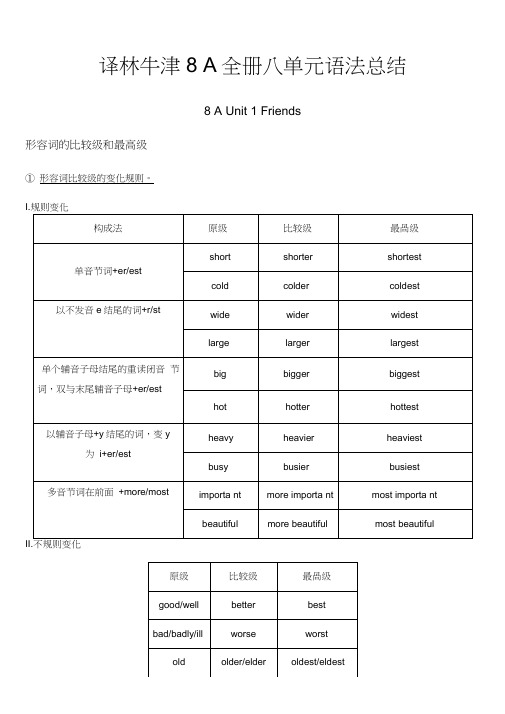
译林牛津8 A全册八单元语法总结8 A Unit 1 Friends形容词的比较级和最高级① 形容词比较级的变化规则。
I.规则变化①形容词比较级用法。
I. 比较级用于两者进行比较,结构为“A is比较级than B ”:1. My bike is more beautiful than hers 我的自行车比她的漂亮。
2. He works harder than before.他工作比以前努力。
II. 表示两者之间选择,用“which/who is比较级,A or B ? ”表示两者之间较 ..... 之一”时,用“the +比较级”结构。
:1. Which is nearer to the sun, the moon or the earth哪个离太阳更近,月球还是地球?2. He is the thinner of the two.他是两人中较瘦的那个。
III. 越来越... ”用比较级and比较级”结构,多音节和部分双音节词用“more and more原级”。
:1. The weather is beco ming colder and colder 天气变得越来越冷了。
2. She is beco ming more and more beautiful.她变得越来越美了。
IV. 表示越.. 越.... ”时,用“ thet匕较级,the+比较级”结构。
:The more careful you are, the more points you will get.你越细心,得分越多。
③形容词最高级用法。
I. 表示三者及以上人或物进行比较时用最高级,结构为“the +最高级+in/of +范围”。
:1. The picture is the best of all.这幅画是所有画中最好的。
2. She is the most beautiful girl in the class.她是班上最美的女孩。
期末复习 译林牛津8A(Unit1-8)知识要点归纳

期末复习| 译林牛津8A(Unit1-8)知识要点归纳译林牛津8AU1知识要点归纳01重点词组或短语1. keep a secret 保守秘密2. care about 关心,关怀3. any time = anytime 在任何时候4. social worker 社会工作者5. future plans 未来计划6. tell about 讲有关……7. as ... as ... 和……一样8. look pretty 看起来漂亮9. feel bored 觉得无聊10. travel around the world 周游世界11. grow up 长大12. a sense of humour 幽默感13. walk past 走过14. nothing else 再也没什么15. make friends 交朋友16. good eyesight 好视力17. tell jokes 讲笑话18. works of art 艺术作品19. make sb happy 使某人快乐20. share one's joy 分享……的快乐02重点语法一、形容词比较级和最高级常用句式当两个对象进行比较时,用形容词的比较级;当三个或三个以上的对象进行比较时,用形容词的最高级,最高级前常加定冠词the。
形容词比较级常用于以下句式:1.“比较级+ than”表示“……比……更”。
例如:This picture is more beautiful than that one.这幅画比那幅画更漂亮。
2.“Which ... +比较级, ... or ...?”用于在两者中选择。
例如:Which is bigger, the sun or the moon?太阳和月亮,哪个更大?3.比较级前可用a little, much, even, far等词修饰,表示程度。
例如:China is much larger than Japan.中国比日本大得多。
新译林八年级上册8A知识点

新译林八年级上册8A知识点新译林八年级上册8A Unit1-8 语法总结语法形容词/副词的比较等级(1)—用法讲解大多数的形容词都有三个级别:原级、比较级、最高级。
其中比较级表示“更……”,用于两者之间的比较,用来说明“前者比后者更……”,比较级前面一般用much, even, a little修饰,其中even, much 只能修饰比较级。
最高级表示“最……”,用于三者及三者以上之间的比较,用来说明“某人或某物在某个范围内最……”①形容词的比较级(-er)和最高级(-est)的构成 a. 规则变化之口诀:直接加;去e 加;双写加;变y加; more/ most b. 不规则变化原级比较级最高级good / well better best bad / ill worseworst many / much more most little less least far farther, furtherfarther, further old older, elder oldest, eldest②比较级前的修饰语 still, even, any, quite(a bit), almost, nearly, just, rather;a little, a bit;much, a lot, far, many;twice, ten times, one fourth, two pounds, three years形容词的比较等级(2)—常见句型他和我一样高。
He is as good a teacher as his father.他和他的父亲一样是个好教师。
’t do as/so much work as you did. 他们干得事没有你多。
I’ve never seen as/so old a car as this.我从来没有见过像这样旧的车。
Tom is two years older than his brother. 汤姆比他的弟弟大两岁。
牛津译林版八年级英语全册语法知识点总结
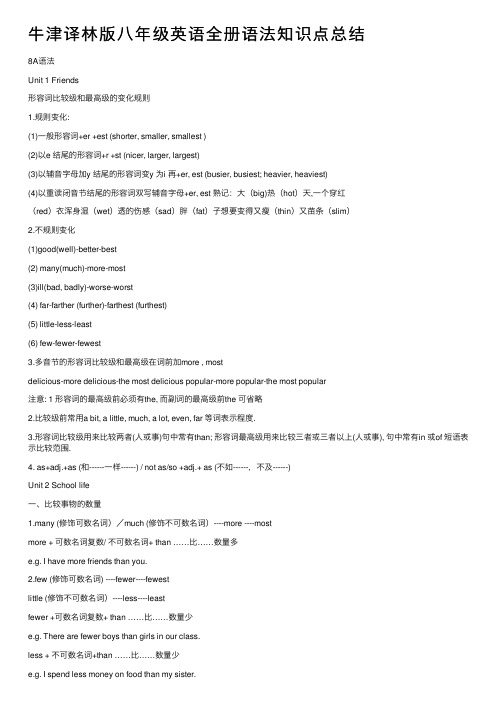
⽜津译林版⼋年级英语全册语法知识点总结8A语法Unit 1 Friends形容词⽐较级和最⾼级的变化规则1.规则变化:(1)⼀般形容词+er +est (shorter, smaller, smallest )(2)以e 结尾的形容词+r +st (nicer, larger, largest)(3)以辅⾳字母加y 结尾的形容词变y 为i 再+er, est (busier, busiest; heavier, heaviest)(4)以重读闭⾳节结尾的形容词双写辅⾳字母+er, est 熟记:⼤(big)热(hot)天,⼀个穿红(red)⾐浑⾝湿(wet)透的伤感(sad)胖(fat)⼦想要变得⼜瘦(thin)⼜苗条(slim)2.不规则变化(1)good(well)-better-best(2) many(much)-more-most(3)ill(bad, badly)-worse-worst(4) far-farther (further)-farthest (furthest)(5) little-less-least(6) few-fewer-fewest3.多⾳节的形容词⽐较级和最⾼级在词前加more , mostdelicious-more delicious-the most delicious popular-more popular-the most popular注意: 1 形容词的最⾼级前必须有the, ⽽副词的最⾼级前the 可省略2.⽐较级前常⽤a bit, a little, much, a lot, even, far 等词表⽰程度.3.形容词⽐较级⽤来⽐较两者(⼈或事)句中常有than; 形容词最⾼级⽤来⽐较三者或三者以上(⼈或事), 句中常有in 或of 短语表⽰⽐较范围.4. as+adj.+as (和------⼀样------) / not as/so +adj.+ as (不如------,不及------)Unit 2 School life⼀、⽐较事物的数量1.many (修饰可数名词)/much (修饰不可数名词)----more ----mostmore + 可数名词复数/ 不可数名词+ than ……⽐……数量多e.g. I have more friends than you.2.few (修饰可数名词) ----fewer----fewestlittle (修饰不可数名词)----less----leastfewer +可数名词复数+ than ……⽐……数量少e.g. There are fewer boys than girls in our class.less + 不可数名词+than ……⽐……数量少e.g. I spend less money on food than my sister.3.the fewest +可数名词复数在……中最少He has the fewest books.4.the least +不可数名词在……中最少She has the least money of us.5.the most + 可数名词复数/ 不可数名词最多Daniel has the most money.⼆、副词的⽐较级和最⾼级(构成⽅法及⽤法与形容词基本相同)1.⼀般在词尾直接加er或est,例如,hard-harder-hardest fast-faster-fastest loud-louder-loudest2、部分双⾳节词和多⾳节词分别在原级前加more构成⽐较级和most构成最⾼级,例如:slowly-more slowly-most slowly clearly-more clearly-most clearlycarefully-more carefully-most carefully3、副词⽐较级和最⾼级的不规则变化well-better-best badly-worse-worstfar-farther/further-farthest/furthestUnit 3 A day out⼀、as…as的⽤法表⽰A与B在某⼀⽅⾯程度相同或不同时⽤形容词/副词原级。
牛津译林版八年级上册(U1-8)全册英语动词固定语法总结及训练
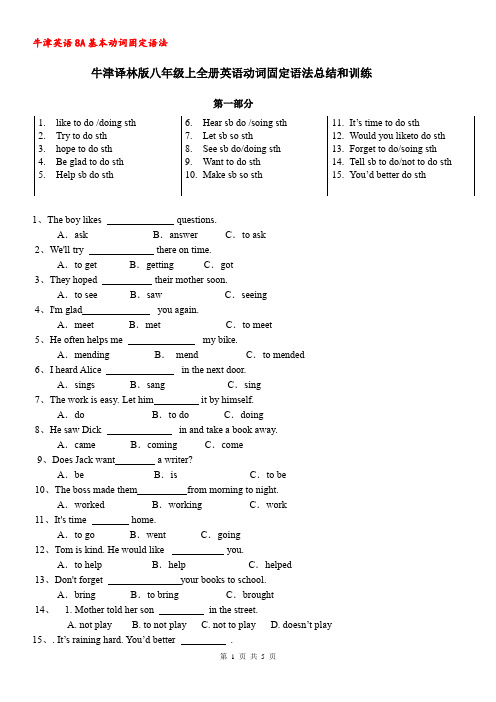
牛津译林版八年级上全册英语动词固定语法总结和训练第一部分1、The boy likes questions.A.ask B.answer C.to ask2、We'll try there on time.A.to get B.getting C.got3、They hoped their mother soon.A.to see B.saw C.seeing4、I'm glad you again.A.meet B.met C.to meet5、He often helps me my bike.A.mending B.mend C.to mended6、I heard Alice in the next door.A.sings B.sang C.sing7、The work is easy. Let him it by himself.A.do B.to do C.doing8、He saw Dick in and take a book away.A.came B.coming C.come9、Does Jack want a writer?A.be B.is C.to be10、The boss made them from morning to night.A.worked B.working C.work11、It's time home.A.to go B.went C.going12、Tom is kind. He would like you.A.to help B.help C.helped13、Don't forget your books to school.A.bring B.to bring C.brought14、 1. Mother told her son in the street.A. not playB. to not playC. not to playD. doesn’t play15、. It’s raining hard. You’d better .A. go outB. not go outC. not to go outD. to not out第二部分1.、I'll remember her the letter.A.give B.gave C.to give2.、He turned on the radio and stopped to the radio.A.listened B.to listen C.listening3.、He had decided it again.A.written B.writing C.to write4.、It's cold. You need warm clothes.A.to wear B.wearing C.wore5.、Mr Black will agree there with you.A.to go B.went C.will go6.、They were able to last year.A.swam B.swim C.swimming7.、She is pleased her friend.A.to meet B.met C.meeting8.、They were sorry that.A.to hear B.heard C.hearing9.、He is sure tomorrow.A.to come B.will come C.coming10.、Teacher told us quiet.A.is B.are C.to be11.、He will teach me this year.A.to skate B.skating C.skated12.、They asked him any noise.A.not making B.no make C.not to make13.、Did you hear her the song in English last night?A.sing B.sang C.to sing D.sings 14.、The students don't know next.A.to do what B.what to doC.what do D.do what15.、The boss made them ten hours a day.A.worked B.working C.work D.to work第三部分1.、I'd like my good friend to my home.A.come B.will come C.coming D.to come 2.、Will you help me this morning?A.do the wash B.to do the washC.do the washing D.doing the washing3.、I'd love that film, will it be on tomorrow?A.see B.to see C.seeing D.seen 4.He told them on with the work.A.to go B.going C.go D.went 5.、We'll try the work before seven o'clock.A.finished B.finish C.to finish D.finishing 6.、It's raining hard. You'd better .A.go out B.not go out C.no to go out D.to not go out 7.、This maths problem is difficult. Let me it over.A.to think B.thinking C.think D.thought8.、Sorry I've kept you for a long time.A wait B.to wait C.waiting D.Waited9.、It's not easy a foreign language.A.learns B.learnC.to learn D.learning10.、I'm hungry. Please give me something .A.eat B.eating C.to eat D.eaten11.、Mr Smith enjoys to light music.Alistens B.to listen C.listening D.listen 12.、It was very late at night he still went on .A.works B.workedC.working D.work13.、When they walked along the river, they suddenly heard somebody for help.A.call B.callingC.called D.to call14.、Stop and listen to me carefully said the teacher.A.to talk B.talking C.talk D.talks15.、The teacher asked me the question in English.A answer.B toanswerC.answered D.answering16.、It was eleven o'clock, she stopped the child from TV.A.watch B.watchingB.C.to watch D.watched17.、He is strong enougn the box.A.carry B.to carryC.carrying D.carries18.、Please be quiet. You talk loudly in the library.A.needn't B.mustn'tC.need D.must19.、Don't be late. You be there on time.A.must B.canC.may D.needn't20.、"I speak to Ann?" "Speaking."A.Must B.May C.Need D.Shall21.I've looked for my pen everywhere, but I find it.A.couldn't B.can'tC.mustn't D.didn't22.、Excuse me ,I ask you a question?A.will B.do C.may D.would23.、"Must I finish my homework now?" "No, you ."A.mustn't B.can't C.needn't D.may not24.、"You must be here at six tomorrow morning.""Sorry I be here so early."A.need B.must C.may D.can't25.、Don't be late. You be there on time.A.must B.can C.may D.needn't26.、We catch up with you. Please speak a little more slowly.A.can B.can't C.may not D.must27.After she finished the letter, she went to bed.A. to writeB. writingC. writtenD. wrote28.It was very late at night, he still went on .A. worksB. workedC. workingD. work29.. I usually forget the door, but I remembered itwhen I left yesterday.A closing, closing B. to close, to closeC. to close, closingD. closing, to close30.Listening! Can you hear a baby ?A. cryB. to cryC. cryingD. cries。
牛津译林版八年级上册全册语法知识点复习总结

牛津译林版八年级上册全册语法知识点复习总结一、形容词的比较级和最高级1. 形容词的比较级用于两个人或事物之间的比较,其结构如下:主语+谓语动词(系动词)+形容词比较级+than+比较对象。
2. 形容词最高级的由用法:形容词最高级用于三者或三者以上的人或物进行比较,其结构为:主语+谓语动词(系动词)+the+形容词最高级+名词+表示范围的短语或从句。
3. 形容词的比较级和最高级是在形容词原级的基础上变化的,分为规则变化和不规则变化。
①规则变化①不规则变化二、比较事物的数量1. 两者之间比较通常用more..than/ less... than 和fewer..than来比较两种事物之间的数量关系。
其中more... than之间加可数名间的复数形式或者不可数名词,less... than 之间加不可数名词,fewer...than 之间加可数名词的复数形式。
例:I has more apples than Lily.我的苹果比莉莉的多。
He eats less food than I for breakfast.他早饭比我吃得少。
Bobby has fewer books than Tim.波比的书比蒂姆的少。
2. 三者或三者以上比较通常用the most、the least、the fewest 来比较三者或三者以上事物之间的数量关系。
the most、the fewest、the least 分别是many/much、few、little 的最高级。
the most 表示“最…;最多”,其后既可接可数名词又可接不可数名词;the fewest 表示“最少”,其后接可数名词的复数形式;the least 表示“最少”,其后接不可数名词。
例:Jack gets the most points of the three boys.在三个男孩中,杰克的得分是最高的。
He has the least milk among them. 他的牛奶是他们之中最少的。
牛津译林版八年级英语上册8A unit1单元知识点归纳总结
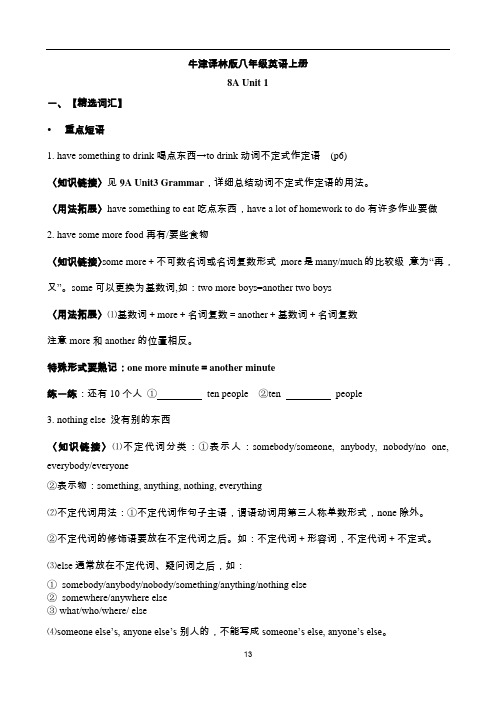
牛津译林版八年级英语上册8A Unit 1一、【精选词汇】重点短语1. have something to drink喝点东西→to drink动词不定式作定语(p6)〈知识链接〉见9A Unit3 Grammar,详细总结动词不定式作定语的用法。
〈用法拓展〉have something to eat吃点东西,have a lot of homework to do有许多作业要做2. have some more food再有/要些食物〈知识链接〉some more+不可数名词或名词复数形式,more是many/much的比较级,意为“再,又”。
some可以更换为基数词,如:two more boys=another two boys〈用法拓展〉⑴基数词+more+名词复数=another+基数词+名词复数注意more和another的位置相反。
特殊形式要熟记:one more minute=another minute练一练:还有10个人①ten people ②ten people3. nothing else 没有别的东西〈知识链接〉⑴不定代词分类:①表示人:somebody/someone, anybody, nobody/no one, everybody/everyone②表示物:something, anything, nothing, everything⑵不定代词用法:①不定代词作句子主语,谓语动词用第三人称单数形式,none除外。
②不定代词的修饰语要放在不定代词之后。
如:不定代词+形容词,不定代词+不定式。
⑶else通常放在不定代词、疑问词之后,如:①somebody/anybody/nobody/something/anything/nothing else②somewhere/anywhere else③ what/who/where/ else⑷someone else’s, anyone else’s别人的,不能写成someone’s else, anyone’s else。
新牛津译林版八年级上8A Unit1-8语法总结

新牛津译林版八年级上8A Unit1-8语法总结形容词和副词有三个级别:原级、比较级和最高级。
比较级用于两者之间的比较,表示“前者比后者更……”,一般用much、even、a little修饰,其中even和much只能修饰比较级。
最高级用于三者及三者以上之间的比较,表示“某人或某物在某个范围内最……”。
形容词的比较级(-er)和最高级(-est)的构成有规则和不规则两种。
规则的构成方式有口诀可记:直接加、去e加、双写加、变y加;不规则的则需要记忆。
比较级前可以加修饰语,如still、even、any、quite(a bit)、almost、nearly、just、rather、a little、a bit、much、a lot、far、many、twice、ten times、one fourth、two pounds、three years 等。
形容词和副词的比较级常见的句型有三种:与……一样(A=BA+ V + as + adj./adv。
+ as + B)、与……不一样(A≠BA + V + not + as/so + adj./adv。
+ as + B)、比……更……(A。
B或A < BA + V +比较级+ than + B)。
例如:他和我一样高(He is as tall as I/me.);他和他的父亲一样是个好教师(Heis as good a teacher as his father.);他们干得事没有你多(They didn’t do as/so much work as you did.);我从来没有见过像这样旧的车(I’ve never seen as/so old a car as this.)。
Tom is older than his brother by two years.XXX.This room is twice the size of that one.XXX is 49 times bigger than the moon.XXX.XXX.The more we get together。
- 1、下载文档前请自行甄别文档内容的完整性,平台不提供额外的编辑、内容补充、找答案等附加服务。
- 2、"仅部分预览"的文档,不可在线预览部分如存在完整性等问题,可反馈申请退款(可完整预览的文档不适用该条件!)。
- 3、如文档侵犯您的权益,请联系客服反馈,我们会尽快为您处理(人工客服工作时间:9:00-18:30)。
八年级上册8AUnit1-8语法总结1. 形容词/副词的比较等级(1)—用法讲解大多数的形容词都有三个级别:原级、比较级、最高级。
其中比较级表示“更……”,用于两者之间的比较,用来说明“前者比后者更……”,比较级前面一般用much, even, a little修饰,其中even, much 只能修饰比较级。
最高级表示“最……”,用于三者及三者以上之间的比较,用来说明“某人或某物在某个范围内最……”①形容词的比较级(-er)和最高级(-est)的构成规则变化之口诀:直接加;去e加;双写加;变y加; more/ mostb. 不规则变化原级比较级最高级good / well better bestbad / ill worse worstmany / much more mostlittle less leastfar farther, further farther, furtherold older, elder oldest, eldest②比较级前的修饰语still, even, any, quite(a bit), almost, nearly, just, rather;a little, a bit;much, a lot, far, many;twice, ten times, one fourth, two pounds, three years形容词的比较等级(2)—常见句型① A=B A+ V + as + adj./adv. + as + B (与。
一样)He is as tall as I/me. 他和我一样高。
He is as good a teacher as his father.他和他的父亲一样是个好教师。
②A≠ B A + V + not + as/so + adj./adv. + as + B (与。
不一样)They didn’t do as/so much work as you did. 他们干得事没有你多。
I’ve never seen as/so old a car as this.我从来没有见过像这样旧的车。
③ A > B 或A < B A + V + 比较级+ than + B (比。
更。
)Tom is two years older than his brother. 汤姆比他的弟弟大两岁。
Our classroom is bigger than theirs. 我们的教室比他们的大。
④表示倍数A + V + twice/four times/… + as + adj./adv. + as + B(A是B的两倍/四倍/…)This room is twice as large as that one. 整个房间是那房间的两倍大。
The earth is 49 times as big as the moon.地球是月球的49倍大。
⑤表示程度的递增主语+ V + 比较级+ and+比较级(…越来越…)主语+ V + more and more+ +adj./adv. (…越来越…)The days are getting shorter and shorter.白天变得越来越长了。
Our country is becoming more and more beautiful.我们的国家变得越来越美了。
⑥表示两种情况同时变化The+ 比较级+ 主语+ V + …,the+ 比较级+ 主语+ V + …(…越…越…)The more we get together, the happier we’ll be.=If we get together more, we’ll be happier.我们聚得越多,我们就会越高兴。
The harder you study, the better you’ll be at English.= If you study harder, you’ll be better at English.你学习越努力,你的英语成绩越好。
⑦主语+ be +one of the+ 最高级+ n.(pl.) + in/of… (…是最…之一)Beijing is one of the oldest cities in China.北京是中国最古老的城市之一。
⑧主语+ V。
+ the+ 最高级+ in/of… (…最…)Ann studies hardest of all the girls in our class.安妮是我们班学习最用功的学生之一。
⑨主语+ V。
+ the+ 比较级+ of the two… (…<两者中>较…的)Lily is the taller of the twins.莉莉是这两个双胞胎中较高的那个。
⑩主语+ V。
+ 比较级+ than + any other +n. (单数) + in… (…比任何其他的更…)主语+ V。
+ 比较级+ than + any of the other +n. (复数) + in…(…比任何其他的更…)He is taller than any other student i n his class.他比他班级中其他的任何学生高。
= He is taller than any of the other students in his class.= He is the tallest students in his class.11 A+ V + more/ fewer + 可数名词复数+ than B …(A比B 做更多、更少。
)A+ V + more/ less + 不可数名词复数+ than B …(A比B 做更多、更少。
)John studies more subjects than Nancy.John比Nancy学更多科目。
Students in the USA have more weeks off in the summertime than British students.在夏天美国学生比英国学生有更多周不上课。
12. A+ V + the same (size/ colour/ age...)as + B (A与B一样)My uniform is the same as Simon’s uniform. 我的校服和Simon的校服一样. Millie’s pencil box is the same size as Amy’s pencil box. 我的铅笔盒和Amy的铅笔盒一样大。
A+ V + different from + B (A与B不一样)Kitty’s rubber is different from Simon’s rubber. Kitty的橡皮和Simon的橡皮不一样。
2. 反身代词第一人称第二人称第三人称单数复数单数复数单数复数myself ourselves yourself yourselves himself/herself/itselfthemselves(1)作动词或介词的宾语:经常在enjoy, teach, hurt, buy, introduce, seat, dress, express, amuse, behave等动词和by, for, to, of等介词后作宾语。
通常表示反身代词与句中的主语是同一人。
它在句中作宾语,不能省略,否则该句是一个意义不完整的错句。
如:He is teaching herself English.她在自学英语。
She was talking to herself.她自言自语。
He lives by himself in the country.他独自住在乡下。
(2)作主语或宾语的同位语:主要起加强语气的作用,译作“亲自,本身,本人”。
如:Did you make the cake yourself?这蛋糕是你亲自做的吗?(yourself作主语you的同位语)The work itself is easy.这工作本身很容易。
(itself作主语the work的同位语)Did you see Mr. Wang himself?你见过王先生本人吗?(himself作宾语Mr. Wang的同位语) (3)作表语:在be, feel, look, seem等系动词后作表语,表示身体或精神状态处于正常。
如:I’m not myself today.今天我感觉不舒服。
I am feeling myself again.我觉得健康如昔。
3 祈使句讲解一、祈使句:用于表达命令、请求、劝告、警告、禁止等的句子叫做祈使句. 祈使句的作用是要求、请求或命令、劝告、建议别人做或不做一件事。
祈使句的句末一般用感叹号,但是有些祈使句的语气较弱,可以用句号结尾祈使句因对象(即主语)是第二人称,所以通常都省略。
祈使句的动词都为一般现在时,例:Go and wash your hands. 例如:保持肃静!Be kind to our sister. Watch your steps. 表示禁止的句式有:不准、不要、别、No parking.二、表现形式●肯定结构:1. Do型(即:动词原形(+宾语)+其它成分)。
如:Please have a seat here.有的祈使句在意思明确的情况下,动词可省略。
如:This way, please. = Go this way, please. 。
2. Be型(即:Be + 表语(名词或形容词)+其它成分)。
如:Be a good boy! 要做一个好孩子!3. Let型(即:Let + 宾语+ 动词原形+ 其它成分)。
如:Let me help you. 让我来帮你。
●否定结构:1. Do型和Be型的否定式都是在句首加don\'t构成,如:Don\'t forget me! Don\'t be late for school!2. Let型的否定式有两种:“Don\'t + let + 宾语+ 动词原形+ 其它成分”和“Let + 宾语+ not + 动词原形+ 其它成分”。
如:Don\'t let him go. / Let him not go. 别让他走。
3. 有些可用no开头,用来表示禁止性的祈使句。
如:No smoking! No fishing! 禁止钓鱼! 用"let"的祈使句时,必须注意下列几点:1、"let" 的否定句有二。
如果宾语是第三人称用"Don't let.....";如果宾语是第一人称,则用"Let......not" :Don't let this type of things happen again.It's raining now. Let's not go out until after the rain.2、"Let"只适用于现在时态,可以有被动语态(the passive voice),如:Let the recalcitrant criminals be sent to prison.Let all the dedicated capable staff be promoted.3、"Let"后头除了是不带"to"的不定式动词(The infinitive without "to")之外,还可以是某些适当的副词,如out, in, down, alone等:Let the puppy out.Open the windows and let the fresh air in.The room is too sunny. Let the blinds down.Let me alone, please.用"Let\'s"时,把谈话者的对象包括在内;用"Let us"时,并不包括对方,如:Let's try it, shall we?Let us do it by ourselves, will you?三.祈使句与并列连词and与or 连用时可以表示条件。
